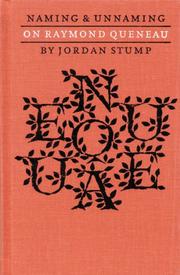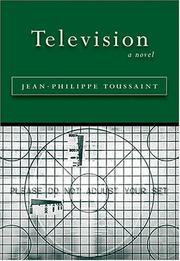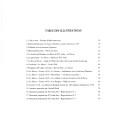| Listing 1 - 7 of 7 |
Sort by
|
Book
ISBN: 1283129191 9786613129192 0803234902 9780803234901 9780803234307 0803234309 Year: 2011 Publisher: Lincoln : University of Nebraska Press,
Abstract | Keywords | Export | Availability | Bookmark
 Loading...
Loading...Choose an application
- Reference Manager
- EndNote
- RefWorks (Direct export to RefWorks)
An examination of the relationship between a text and its ""other"" forms--translation, manuscript, critical edition, copy--and what can be gleaned from this textual interplay.
Fiction --- History and criticism --- Theory, etc.

ISBN: 080321913X 0803242689 Year: 1998 Publisher: University of Nebraska Press
Abstract | Keywords | Export | Availability | Bookmark
 Loading...
Loading...Choose an application
- Reference Manager
- EndNote
- RefWorks (Direct export to RefWorks)
Book
ISBN: 1282233947 9786613811684 0803244649 9780803244641 9780803239913 Year: 2012 Publisher: Lincoln : University of Nebraska Press,
Abstract | Keywords | Export | Availability | Bookmark
 Loading...
Loading...Choose an application
- Reference Manager
- EndNote
- RefWorks (Direct export to RefWorks)
From one of the most original French writers of our day comes a mysterious, prismatic, and at times profoundly sad reflection on humanity in its darker moments-one of which may very well be our own. In a collection of fictions that blur distinctions between dreaming and waking reality, Lutz Bassmann sets off a series of echoes-the "entrevoutes" that conduct us from one world to another in a journey as viscerally powerful as it is intellectually heady. While humanity seems to be fading around them, the members of a shadowy organization are doing their inad
Soldiers --- Monks --- War stories. --- War --- Fiction
Book
ISBN: 9780914671534 0914671537 Year: 2016 Publisher: Brooklyn (N.Y.) : Archipelago Books,
Abstract | Keywords | Export | Availability | Bookmark
 Loading...
Loading...Choose an application
- Reference Manager
- EndNote
- RefWorks (Direct export to RefWorks)
"Imagine being born into a world where everything about you--the shape of your nose, the look of your hair, the place of your birth--designates you as an undesirable, an inferior, a menace, no better than a cockroach, something to be driven away and ultimately exterminated. Imagine being thousands of miles away while your family and friends are brutally and methodically slaughtered. Imagine being entrusted by your parents with the mission of leaving everything you know and finding some way to survive, in the name of your family and your people. Scholastique Mukasonga's Cockroaches is the story of growing up a Tutsi in Hutu-dominated Rwanda--the story of a happy child, a loving family, all wiped out in the genocide of 1994. A vivid, bittersweet depiction of family life and bond in a time of immense hardship, it is also a story of incredible endurance, and the duty to remember that loss and those lost while somehow carrying on. Sweet, funny, wrenching, and deeply moving, Cockroaches is a window onto an unforgettable world of love, grief, and horror"
Atrocities. --- BIOGRAPHY & AUTOBIOGRAPHY --- Ethnic relations. --- Genocide --- Genocide. --- Hutu (African people) --- Tutsi (African people) --- Women authors, Black --- Women authors, Black. --- Historical. --- Personal Memoirs. --- Women. --- History --- Politics and government --- Politics and government. --- Crimes against --- Crimes against. --- Mukasonga, Scholastique. --- Civil War (Rwanda : 1994). --- 1900-2099. --- Rwanda --- Rwanda. --- Ethnic relations --- Atrocities
Book
ISBN: 1914198093 Year: 2018 Publisher: New York : Archipelago Books,
Abstract | Keywords | Export | Availability | Bookmark
 Loading...
Loading...Choose an application
- Reference Manager
- EndNote
- RefWorks (Direct export to RefWorks)
Ethnic relations. --- Genocide --- Hutu (African people) --- History --- Politics and government

ISBN: 9781564783721 1564783723 Year: 2004 Publisher: Londen Dalkey Archive Press
Abstract | Keywords | Export | Availability | Bookmark
 Loading...
Loading...Choose an application
- Reference Manager
- EndNote
- RefWorks (Direct export to RefWorks)


ISBN: 2877753921 9791024010786 Year: 2018 Publisher: Mont-Saint-Aignan : Presses universitaires de Rouen et du Havre,
Abstract | Keywords | Export | Availability | Bookmark
 Loading...
Loading...Choose an application
- Reference Manager
- EndNote
- RefWorks (Direct export to RefWorks)
Regardez ces passants qui se promènent au Havre, sur le boulevard Maritime, au début du siècle dernier. Observez ces deux femmes qui sont en sortie, un de ces dimanches de la vie, une ombrelle à la main, venant de Sainte-Adresse. Leur mystère est sans origine et sans fin. Et pourtant l'écriture ne va cesser de faire ce retour en amont vert sa propre origine. Raymond Queneau a quitté Le Havre à dix-sept ans mais son œuvre y retourne et ne cesse d'interroger ce point inouï où l'origine à la fois se révèle et se dérobe. Et voici que nous aussi, dans cet hommage que sa Ville Natale rend à l'écrivain, nous scrutons les figures multipliées de l'origine : écriture autobiographique, généalogie des personnages, genèse du texte, métaphysique cachée, archéologie du savoir, origine des langues, archétypes de l'inconscient, Eros et le Rêve... Dans ce tourbillon sans fin qui gravite autour de l'énigme de la création littéraire, nous sommes à notre tour inspirés par l'attraction d'un invisible trou noir dont l'absence nous fascine. Point de non-retour et pourtant vers lequel on ne peut qu'essayer de faire retour : tel est le mystère des origines.
French literature --- Littérature française --- Queneau, Raymond, --- Literature (General) --- roman --- écriture --- écrivain --- Havre
| Listing 1 - 7 of 7 |
Sort by
|

 Search
Search Feedback
Feedback About UniCat
About UniCat  Help
Help News
News